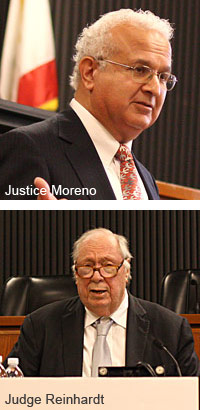Justice Moreno, Judge Reinhardt Deliver Bodenheimer, Barrett Lectures
 In two highly anticipated events, California Supreme Court Justice Carlos Moreno delivered the Brigitte M. Bodenheimer Lecture on Family Law at King Hall on February 11, and Judge Stephen R. Reinhardt of the U.S. Court of Appeals for the Ninth Circuit delivered the Edward L. Barrett, Jr. Lecture on Constitutional Law on February 25.
In two highly anticipated events, California Supreme Court Justice Carlos Moreno delivered the Brigitte M. Bodenheimer Lecture on Family Law at King Hall on February 11, and Judge Stephen R. Reinhardt of the U.S. Court of Appeals for the Ninth Circuit delivered the Edward L. Barrett, Jr. Lecture on Constitutional Law on February 25.
The Bodenheimer lecture was established in 1981 in memory of Professor Brigitte M. Bodenheimer, an internationally renowned teacher, scholar, and reformer of the law, in order to bring prominent scholars and practitioners to King Hall to discuss recent developments affecting the family.
A pioneering Latino in the judiciary and a longtime friend of the Law School who frequently has spoken at King Hall, Justice Moreno described his lecture as an effort to "explore the promise of equality and how that promise has been affected by the evolution of the family and how we define family." He touched on several California Supreme Court decisions with regard to family law, including its 2008 ruling to recognize same-sex marriage and its 2009 decision to uphold California's Proposition 8, a voter initiative prohibiting the recognition of same-sex marriage. Justice Moreno was the lone dissenter in the Proposition 8 case.
Proceeding from the Declaration of Independence's assertion of "self-evident" truths, he noted that "our view of what truths are self-evident really changes over time," and traced some of the ways in which family law has been impacted.
"The things that seem self-evident now--for example, that interracial couples should have the right to marry--were not always so," he said. "I offer to you the idea that what will appear self-evident and commonly accepted throughout our state and throughout our nation 20 years from now on this question of same-sex marriage, only time will tell."
The Barrett lecture, established in 1986 to mark the retirement of Edward L. Barrett, Jr., founding Dean of UC Davis School of Law and a nationally renowned Constitutional Law and Criminal Procedure scholar, featured Judge Reinhardt of the San Francisco-based Ninth Circuit, the largest federal appellate court in the nation, in a presentation entitled "Life to Death: Our Constitution and How It Grows."
Judge Reinhardt, one of the most influential--and most liberal--judges in the country, spoke on the conflicting modes of interpreting the U.S. Constitution that prevail on the federal bench today, and argued for a "living constitutionalist" interpretation of the nation's founding document.
"For originalists who cleave to the notion that the only permissible interpretation of the text of the Constitution is that which existed at the time it was drafted, the Constitution is in many ways a historical artifact, designed to enshrine permanently the status quo of that time," he said. "For others, among whom I count myself, the Constitution is a living document that primarily guarantees rights and privileges to the inhabitants of contemporary America, rights and privileges that may expand as our nation continues to develop. For those of us who believe in a living Constitution, the Constitution itself is much more than a historical text to be parsed for its literal original meaning. Rather it is a collective covenant, designed to effectuate the broad purposes outlined in its preamble."
Judge Reinhardt also offered his observations on issues likely to come before the Court in the near future and possible nominees for the next opening on the Court.
